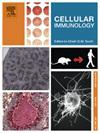麦胶蛋白增强了应激β细胞引发的巨噬细胞反应
IF 2.9
4区 医学
Q2 CELL BIOLOGY
引用次数: 0
摘要
在人类中,无麸质饮食可以减缓疾病进展并改善新诊断的1型糖尿病患者的临床结果。在NOD小鼠中,自身免疫性糖尿病的发病率受到β细胞活性和谷蛋白的影响。在这里,我们证明代谢应激胰腺细胞系(MIN6, β TC3和α TC3)有效激活巨噬细胞RAW 264.7细胞。麦胶蛋白在MIN6细胞中进一步增强了这种反应,但在β TC3或α TC3细胞中没有这种作用。此外,麦胶蛋白直接刺激MIN6细胞,影响与细胞活化、应激反应和免疫调节相关的途径。这些发现通过强调细胞应激和麦胶蛋白在疾病进展中的作用,为无麸质饮食在1型糖尿病发展中的体内益处提供了见解。本文章由计算机程序翻译,如有差异,请以英文原文为准。
Gliadin amplifies the macrophage response triggered by stressed beta cells
In humans, a gluten-free diet can slow disease progression and improve clinical outcome in newly diagnosed type 1 diabetes patients. In NOD mice, the incidence of autoimmune diabetes is influenced by both beta cell activity and gluten. Here, we demonstrate that metabolically stressed pancreatic cell lines (MIN6, beta TC3, and alpha TC3) effectively activated macrophage RAW 264.7 cells. Gliadin further enhanced this response in MIN6 cells but had no such effect on beta TC3 or alpha TC3 cells. Additionally, gliadin directly stimulated MIN6 cells, affecting pathways related to cellular activation, stress responses, and immune regulation. These findings provide insights into the in vivo benefits of a gluten-free diet in type 1 diabetes development by highlighting the roles of cellular stress and gliadin in disease progression.
求助全文
通过发布文献求助,成功后即可免费获取论文全文。
去求助
来源期刊

Cellular immunology
生物-免疫学
CiteScore
8.20
自引率
2.30%
发文量
102
审稿时长
30 days
期刊介绍:
Cellular Immunology publishes original investigations concerned with the immunological activities of cells in experimental or clinical situations. The scope of the journal encompasses the broad area of in vitro and in vivo studies of cellular immune responses. Purely clinical descriptive studies are not considered.
Research Areas include:
• Antigen receptor sites
• Autoimmunity
• Delayed-type hypersensitivity or cellular immunity
• Immunologic deficiency states and their reconstitution
• Immunologic surveillance and tumor immunity
• Immunomodulation
• Immunotherapy
• Lymphokines and cytokines
• Nonantibody immunity
• Parasite immunology
• Resistance to intracellular microbial and viral infection
• Thymus and lymphocyte immunobiology
• Transplantation immunology
• Tumor immunity.
 求助内容:
求助内容: 应助结果提醒方式:
应助结果提醒方式:


